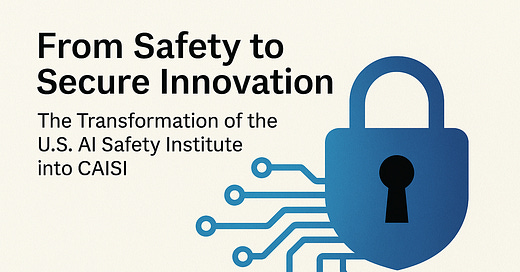Yesterday, the Commerce Secretary, Howard Lutnick, announced that the U.S. AI Safety Institute (AISI) will be reformed and renamed the Center for AI Standards and Innovation (CAISI). The announcement confirms the new administration's commitment to AI standards while changing the emphasis from safety to secure innovation. In his statement, the Secretary uses a somewhat contradictory language, highlighting how CAISI will ensure adherence to national security standards while not limiting innovators by these standards:
“For far too long, censorship and regulations have been used under the guise of national security. Innovators will no longer be limited by these standards. CAISI will evaluate and enhance U.S. innovation of these rapidly developing commercial AI systems while ensuring they remain secure to our national security standards.”
The move reflects the accelerationist plea of companies like OpenAI, which in their March response to the Office of Science and Technology Policy in support of the new AI Action Plan asks for “freedom to innovate” and suggests that “reimagining the US AI Safety Institute, [..] would provide domestic AI companies with a single, efficient ‘front door’ to the federal government that would coordinate expertise across the entire national security and economic competitiveness communities.”
While this action may represent a positive step in reaffirming a focus on standards and collaboration with the industry, it would be more beneficial for Congress to authorize and fund CAISI permanently. In doing so, it should codify its mission, reflecting a broader set of stakeholder inputs. The institute's work is crucial for developing the safeguards necessary to harness progress in AI, and sustained funding would ensure its ability to carry out its mission effectively.
The original mission of AISI, as outlined in its strategic vision document, emphasized advancing the science of AI safety, developing standardized metrics for frontier AI, and fostering national and global coordination on AI safety issues. Quoting from the AISI website, created on May 20, 2024, as updated on January 17, 2025, before the Trump administration announcement:
“The Strategic Vision document describes US AISI’s philosophy, mission, and strategic goals. Rooted in two core principles—first, that beneficial AI depends on AI safety; and second, that AI safety depends on science—the AISI aims to address key challenges, including a lack of standardized metrics for frontier AI, underdeveloped testing and validation methods, limited national and global coordination on AI safety issues, and more.”
The transition to CAISI retains some of these core objectives and strongly emphasizes collaboration with industry to develop voluntary standards and best practices, primarily on security. The duality is clear: security focuses on technical and operational aspects, while safety can be interpreted to go beyond that and into the sociotechnical aspects of AI. The latter are clearly out of fashion under the current administration. CAISI will work closely with NIST organizations to develop guidelines and best practices to measure and improve the security of AI systems. It will also establish voluntary agreements with private sector AI developers and lead evaluations of AI capabilities of “potential security vulnerabilities and malign foreign influence arising from use of adversaries’ AI systems, including the possibility of backdoors and other covert, malicious behavior.”
Notably, the announcement also directs the agency to “[r]epresent U.S. interests internationally to guard against burdensome and unnecessary regulation of American technologies by foreign governments and collaborate with the NIST Information Technology Laboratory to ensure US dominance of international AI standards.” This is a clear statement on how the Commerce Department will lead in international trade and AI diplomacy and may use the center’s work to support this effort.
I have long advocated for the role of standards, built in partnership with industry, as the first part in a process to produce the safeguards that will harness progress in AI. CAISI is well-positioned to play a central role in this process, as well as in AI diplomacy and the diffusion of American AI technology. This announcement aligns with what I heard during my visits with stakeholders and Congressional staffers in April.
The transformation of AISI into CAISI is a step towards deeper collaboration with the industry and the promotion of American standards. It is reassuring to see the administration’s emphasis on these and a proactive AI diplomacy.
A question remains whether security will be enough for a safe future.





